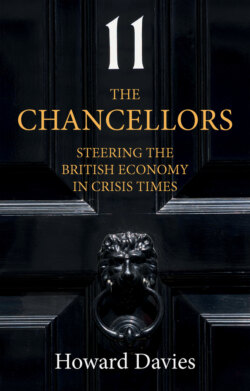Читать книгу The Chancellors - Howard Davies - Страница 10
2016–20: The EU Referendum and after
ОглавлениеThe third period needs some disaggregation. The Covid-related lockdowns beginning at the end of the first quarter of 2020 confuse the picture. It is too early to say how the economy will recover from a highly unusual health-related government intervention. Also, at the end of 2020 the post-Brexit era began, initially with a very large impact on trade volumes with the EU. Exports to the EU fell by 40% in the first two months of 2021, then stabilized somewhat as firms became more accustomed to the new arrangements.
These immediate post-Brexit trade figures are volatile and may be misleading. But we can assess the period from 2016, when the referendum campaign was announced, to the beginning of the Covid recession. The data strongly suggest that there was a significant change of trend. Up to the referendum, UK GDP growth remained above the average of the other advanced economies, except for a brief period around the end of 2011. Since the referendum, UK growth has been lower than the average. The IFS has constructed a ‘doppelgänger’ of the UK economy, based on a weighted average of the OECD economies that performed most similarly to it up to the end of 2015. The doppelgänger tracks the UK closely, apart from a period during the financial crisis when the UK underperformed. That was not surprising given the UK’s, and especially London’s, exposure to trends in global finance. But, as the IFS says, ‘since 2016 a sustained divergence has opened up between realised GDP and the level implied by the synthetic model’.16 By the end of 2019 the economy was 2.5% smaller than expected had the predicted pre-referendum growth trend continued. The differential is closer to 3% if one takes account of the unexpected increases in global growth since 2016. The doppelgänger grew more rapidly than before. The IFS acknowledges that ‘the estimates from this model cannot provide a perfect indication of what would have happened had the Brexit referendum gone the other way’, but they are strongly suggestive. What can we learn about why this change of trend occurred?
The clearest immediate impact of Brexit was a sharp fall in sterling. Between May and September 2016 sterling dropped from €1.31 to €1.11. That suggested a market view that the UK’s growth prospects had deteriorated. But contrary to the Treasury’s 2016 forecasts, the domestic economy continued to grow, fuelled by an increase in consumer spending financed in part by a dramatic fall in the saving rate, from 10% in the second half of 2015 to around 4% by the end of 2016, and in part by rising nominal wages, which returned to the pre-crisis average of 4% a year. Between 2015 and 2019, unit labour costs in UK manufacturing rose by almost 10 percentage points more than in Germany, negating most of the competitive impact of sterling’s devaluation.
The most depressing observation is that productivity remained flat, and business investment was remarkably weak. The UK appears to have lost out in many of the new, high innovation, high productivity sectors.17 Investment took a long time to recover from the 2008 recession, but it grew by some 10% from 2012 to 2015. Since the referendum, it has dropped to the bottom of the G7 range and by 2019 it was 20% below what it would have been had the post-2008 trend line continued. That change in trend appears to be linked to a rise in economic uncertainty which, in turn, is linked to the referendum result and the consequential concerns about the terms of Britain’s future trading relationships with the EU and other countries.18 It is probable that, as business adjusts to a new set of trading relationships, that uncertainty will diminish, but the future course of investment remains highly uncertain.
The OBR, in its budget report in March 2021, assumes that long-run UK productivity and growth will be 4% lower as a result of Brexit, and that ‘around two-fifths of the 4 per cent impact has effectively already occurred as a result of uncertainty since the referendum weighing on investment and capital deepening’.19 By 2019, UK GDP per head was 88% of the German figure; in 2007 it had been 94%.
So in economic terms, the period ends on a downbeat note. The UK’s Covid-induced recession was deeper than average for developed countries, and the immediate recovery a little stronger. But setting that aside, the economy seemed set for a period of sub-par growth, underperforming even a not very challenging set of comparators in Europe. The Treasury can hardly be blamed for that, or for Brexit. All the Chancellors before Sunak were firmly against leaving the EU, as were most if not all the senior officials, however emotionally disengaged from the European project they might have been. It is highly unusual for a sophisticated developed economy to have its economic and trading policy upended on non-economic grounds. The verdict on the Brexit experiment will take years, if not decades, to be handed down.
